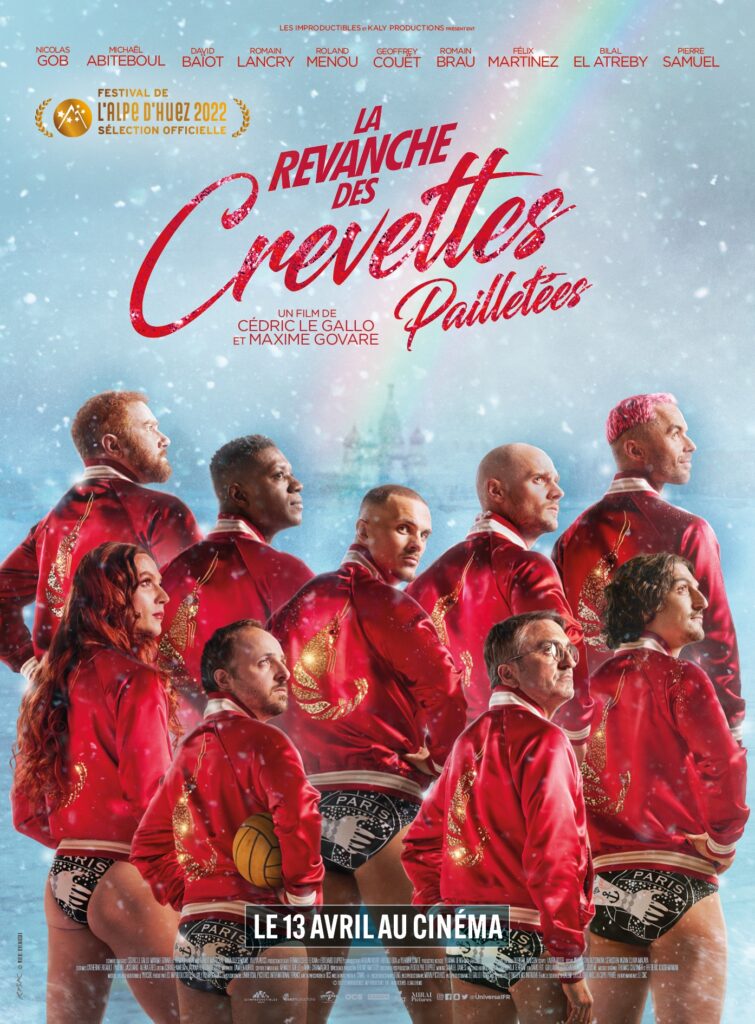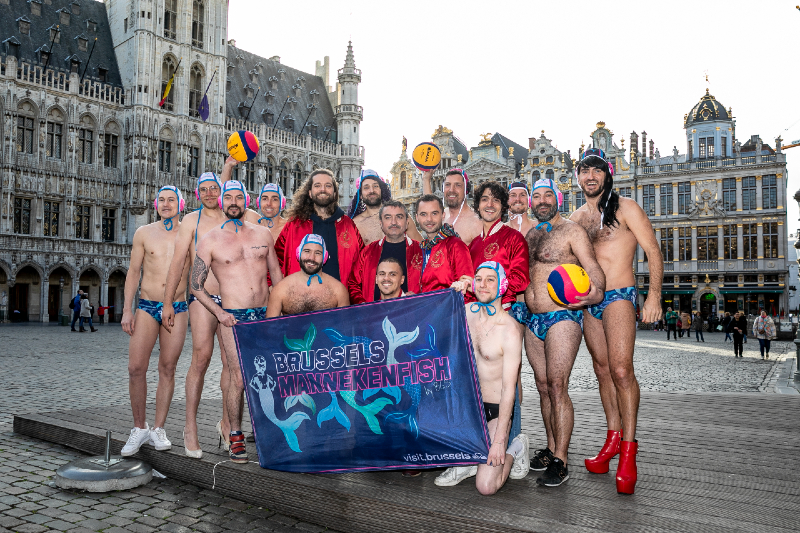On 7 April, the icy wind made it bone-chilling cold on the Grand Place. Tourists were wandering around in their winter jackets. A warm waffle in one hand, some of them were unsuccessfully trying to frame a selfie with the tower of the town hall.
Suddenly, all eyes turned towards a group of men in speedos, water polo caps, wigs, and heels crossing the main square of the capital of Europe. A trained eye might have recognised the mermaid-boy displayed on the flag they were waving.
The Brussels Mannekenfish were braving the late winter weather to immortalise the visit of their special guests: the Shiny Shrimps – the most famous LGBTQIA+ water polo players in the world – were in town to promote the second opus of their adventures.
The birth of the Shiny Shrimps
In 2019, director Cédric Le Gallo brought to the screen the chronicles of an inclusive water polo team on its way to the Gay Games, a story inspired from his personal experience as a member of the Outsiders water polo team in Paris. The comedy made more than 600,000 viewers burst with laughter and shed tears of emotion, reaching out to an audience well beyond the members of the LGBTQIA+ community.
As Cédric Le Gallo recalled, Les Crevettes Pailletées was the first French gay-themed comedy to reach the movie theatres since Pédale Douce in 1996. It was time for a new generation of LGBTQIA+ people to bring their stories to the screen, in a context that had dramatically evolved since the 1990s.
In France, this first opus triggered a much-needed discussion regarding homophobia in sports. The number one sports newspaper in the country, L’Equipe, even published on the front page of its weekly magazine the picture of two male water polo players kissing with the headline “Kiss whoever you want”. A powerful image – and, for some, a shocking one – to make its readership reflect on the culture of toxic masculinity and homophobia still conveyed in the practice of sport.
Yet, as they are back to take their revenge, the second opus takes the Shiny Shrimps outside of the swimming pools. It is time for them to confront homophobia and transphobia in over arenas.
A revenge that turns more political
After their trip to Croatia, we meet Vincent, Xavier, Alex, Damien, Joël, Fed and their coach Matthias at the airport on their way to the Gay Games in Tokyo. To make sure all of them can afford the trip to Japan, they bought cheap tickets with a 24-hours stop-over in Russia. Of course, nothing will go as planned.
As they are ready to embark on this new adventure, each of them is hiding something from the others. All those secrets will derail their trip and be the trigger of an avalanche of hilarious situations as the Shiny Shrimps get stuck in a land overtly hostile to LGBTQIA+ people.
Since 2013 and the adoption of the federal law “for the Purpose of Protecting Children from Information Advocating for a Denial of Traditional Family Values”, it is illegal in Russia to talk about homosexuality and to display any non-heteronormative behaviour in the public space. There, two men kissing on the cover of a magazine or in the street is a criminal offence.
In this context, this revenge of the Shiny Shrimps brings up a large array of situations denouncing state homophobia, transphobic comments as well as “conversion therapies” pretending to “cure” homosexuality. In one of the most tragic scenes, the new member of the team endures electroshocks, a method still used in such “therapies” to “reeducate” gay men. The movie reminds us that even if those “therapies” have been banned in France since early 2022 – after the story was written – they are still a reality in most countries of the world.
There is no time to breathe in this fast-paced comedy which, like the first opus, is also charged with emotional scenes. The audience at the Brussels preview in Cinema Galeries laughed wholeheartedly.
While the set up in Russia is an effective way to criticise homophobic behaviours with a comedic twist, it is important to keep in mind that homophobia and transphobia are not only happening in foreign lands. The satire is as much valid in Belgium and other western countries.
A movie that resonates with the Ukrainian conflict
Given the situation in Russia, it was impossible to shoot the movie there. Cédric Le Gallo turned to Ukraine where the cast spent a few months at the beginning of 2021. The director and the actors discovered in Kiev a vibrant LGBTQIA+ community. They were touched by the dedication of the Ukrainian staff and actors to support freedom, inclusiveness, and democratic values.
When, on 24 February, Russia launched its attack against Ukraine, the promotion of the movie took an even more political dimension. Some of the local actors turned into soldiers while the alternative club where the team used to party during the weekend turned into a shelter.
At each preview ever since, Cédric Le Gallo stresses the importance of showing support to his friends that turned into warriors. To boost their morale and show them that the west is not forgetting them, the cast record a video with the preview audience screaming “Slava Ukraini” – Glory to Ukraine.
Real competitions delayed
Back in real life, the Brussels Mannekenfish have been waiting for a reunion with their water polo friends from all around the world. The real Gay Games – planned to be in Hong Kong in November 2022 – have been postponed to November 2023.
As Covid-19 still threatens the event, the Federation of Gay Games announced recently that a backup event is being planned in Guadalajara, Mexico – to make sure that the event will take place, no matter what.
After Asia and Central America, the next Gay Games will take place in Europe as Valencia recently won the bid for the 2026 edition.
The Brussels Mannekenfish – who resumed their training last September in the Bains de Bruxelles after a year and a half of interruption – are looking forward to getting back into competition. In early June, they will take part in the Paris international tournament, where the water polo competition is organised by none other than the players of Outsiders – the real Shiny Shrimps.

You may also like
-

“March Is for the Queers”: Why You Should Put Queer March Ghent 2026 on Your Radar
Every March, Queer March turns Ghent into a month-long celebration of queer life, resistance, and
-

Why You Absolutely Must Watch This Documentary “Mister Nobody Against Putin” on ARTE
In ARTE’s documentary Mister Nobody Against Putin, a school worker in a polluted Russian town turns
-

The Rocky Horror Picture Show at Flagey: A Cult Classic Returns to Brussels
This December, Le Rocky Horror Picture Show takes center stage at Flagey, inviting fans and newcomers alike to
-

Wicked Part Two: The Magical Return Hits Cinema Palace Brussels
Wicked: Part Two, the grand finale of the beloved Broadway musical’s cinematic journey, premieres in
-

The Queers Are Coming: Pink Screens Returns for Its 24th Edition in Brussels
Brussels rolls out the fuchsia and yellow carpet once again as the Pink Screens – Brussels

